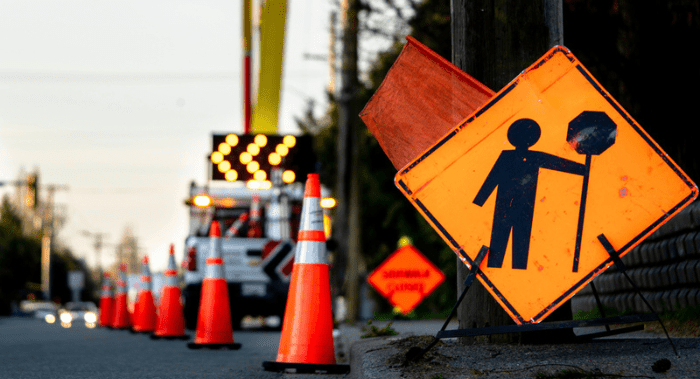Complete the form to schedule a free consultation with a traffic lawyer
How Temporary Traffic Signs Can Turn Into a Traffic Ticket

Navigating the roads requires a driver to stay alert to a myriad of signs, signals, and road markings. However, it’s the temporary traffic signs—those put up for short periods—that can catch even the most vigilant drivers off-guard. These signs are crucial, often signaling changes due to construction, events, or emergencies. Yet, they’re also a frequent source of violations, primarily because drivers either overlook or misunderstand them.
Construction Zones: Higher Stakes and Hefty Fines
A common scene for temporary signs is the construction zone. In 2022, the Federal Highway Administration reported that, between 2020 and 2021, work zone fatalities increased by 10.8 percent. Such zones often have reduced speed limits to ensure the safety of the workers. For instance, in Texas, a driver caught speeding in a work zone when workers are present can face double the fine compared to regular speeding violations.
Event Traffic Management: A Case of the ‘Big Game’
Events can dramatically alter regular traffic patterns.
Consider a major sporting event like the Super Bowl. When Atlanta hosted Super Bowl LIII in 2019, the city erected temporary “No Parking” signs around the Mercedes-Benz Stadium to handle the increased traffic and security concerns. However, hundreds of vehicles were towed for parking in these temporarily restricted areas, many owners claiming they didn’t notice the signs or misunderstood the timing stated.
Emergency Situations: The Ambiguity of ‘No Entry’
Emergencies such as floods, fires, or even public health crises can lead to the sudden appearance of temporary signs. These can include detour signs, road closures, or restricted entry points. In 2020, during the initial outbreaks of COVID-19, several cities marked areas as quarantine zones, blocking entry with temporary signage. In New York, where such zones were implemented, drivers frequently claimed confusion over these sudden restrictions, leading to unintentional violations.
The Challenge of Temporary Signs: Design and Display
Part of the problem with temporary signs is their inconsistency in design and display. Unlike standardized permanent signs, temporary signs may be hastily made, sometimes lacking clarity or visibility. The Manual on Uniform Traffic Control Devices (MUTCD) sets standards for road signs, but during urgent situations, these standards might not always be adhered to fully.
Despite this tendency towards ambiguity and inefficiency, drivers will still be held responsible to the full extent of the law for any violation of these vague, hastily-made signs. This could mean fines, a license suspension, or even jail time, if the infraction is considered serious enough.
Knowing the Road and Your Rights
While it’s certainly true that temporary road signs are vital for protecting the health and safety of drivers and workers alike, a traffic infraction can quickly become a massive interruption to one’s daily life with the onset of unforeseen financial burdens, the ability to drive being stripped, among other potential penalties for violating a temporary restriction on the road.
The most important thing to know is that you can fight your traffic ticket.
Click here or call 1-888-296-3059 for a free consultation with a traffic attorney.
